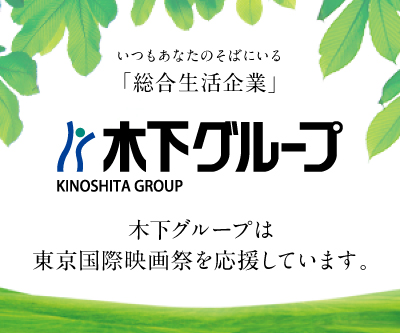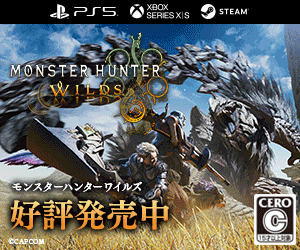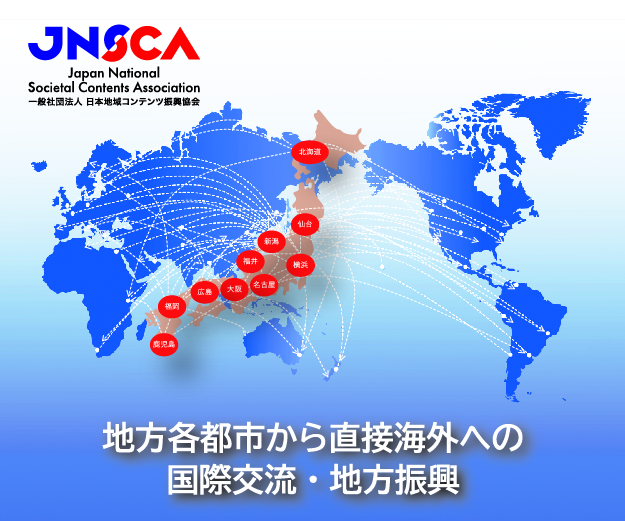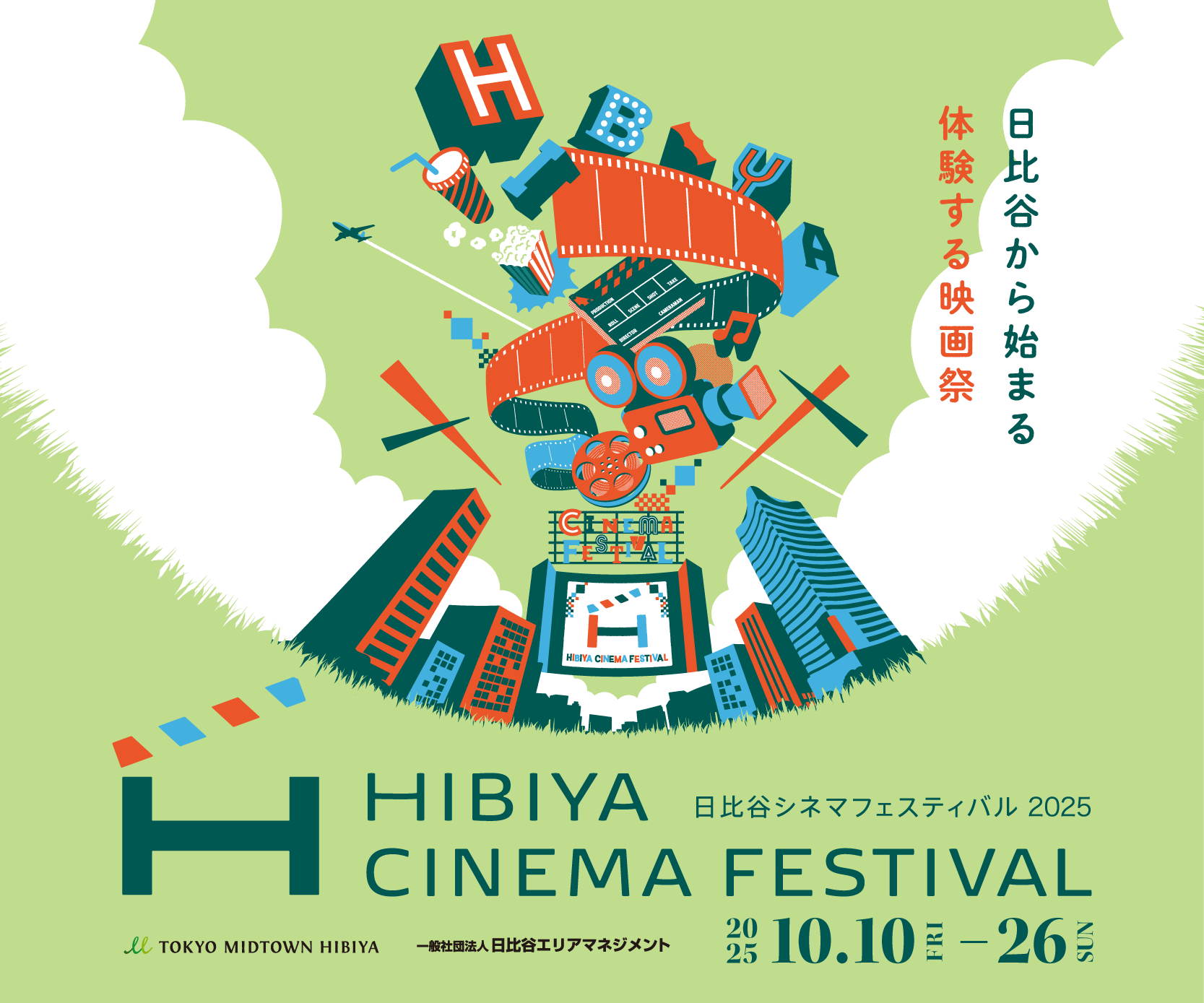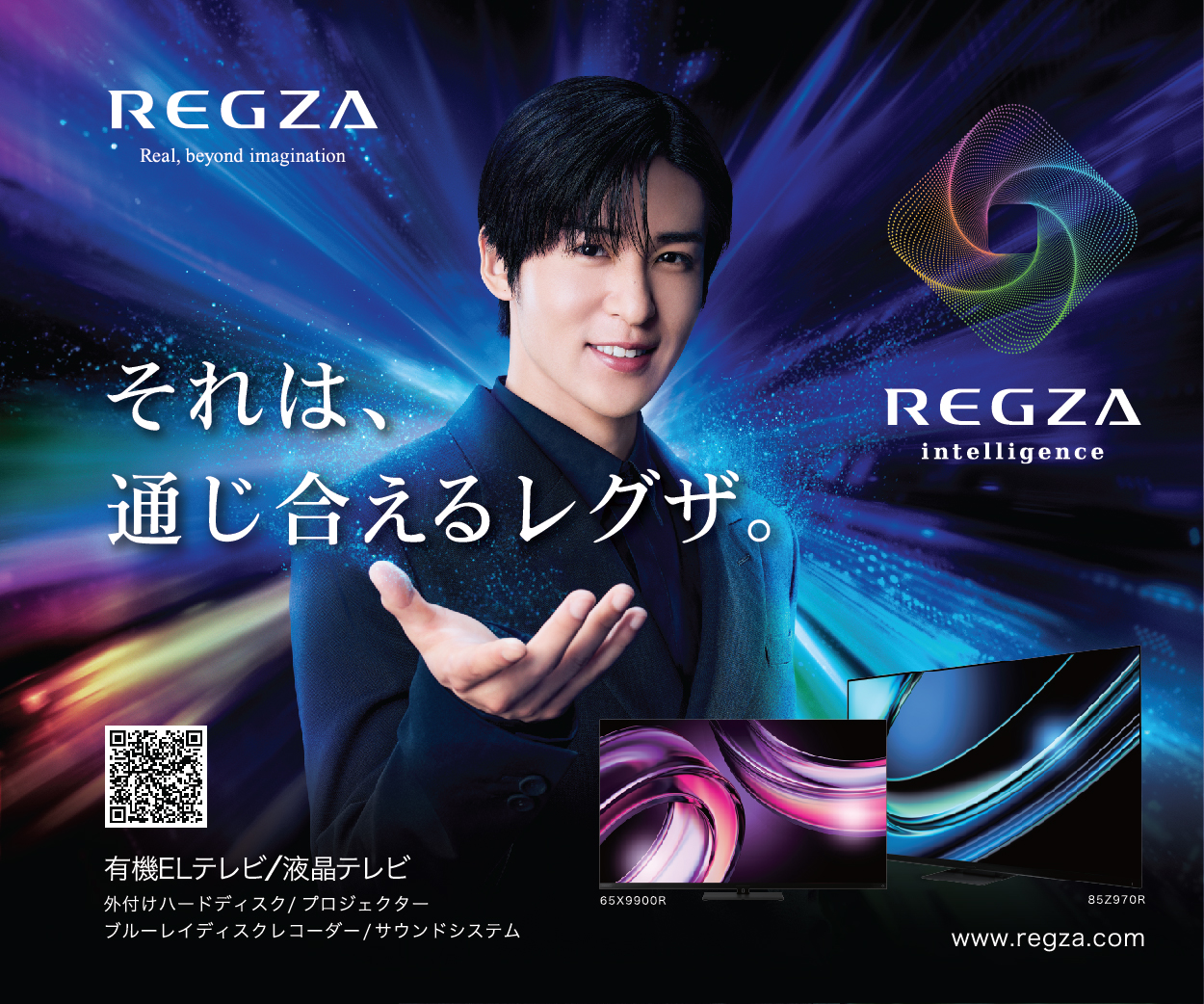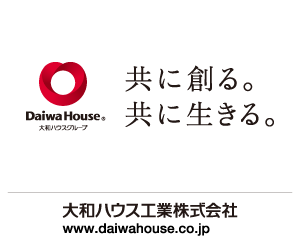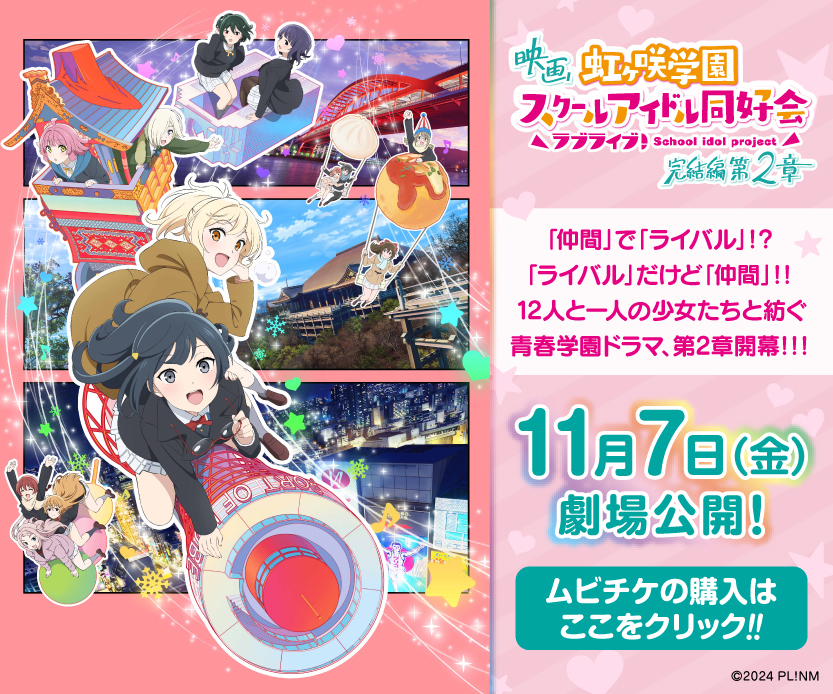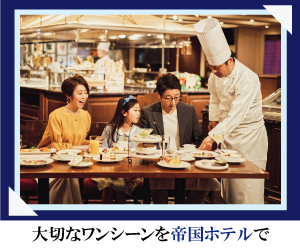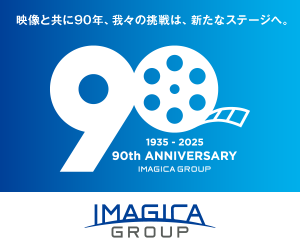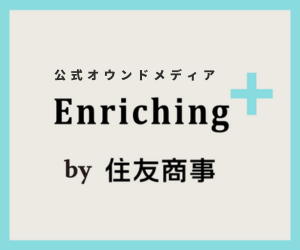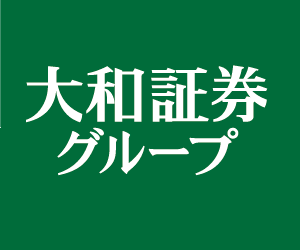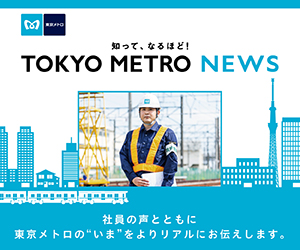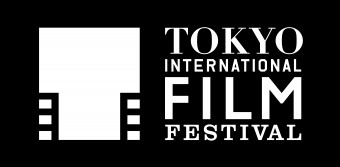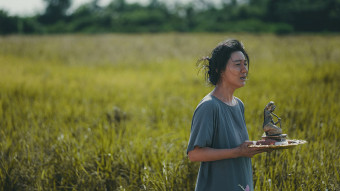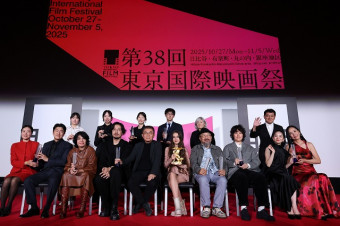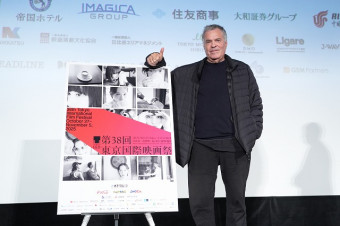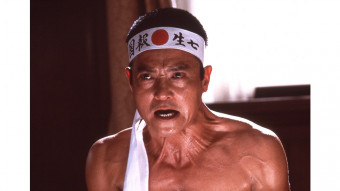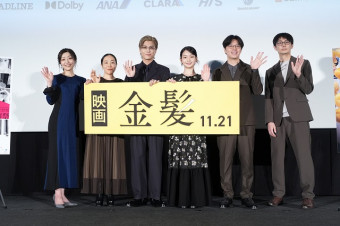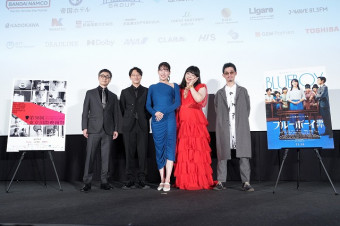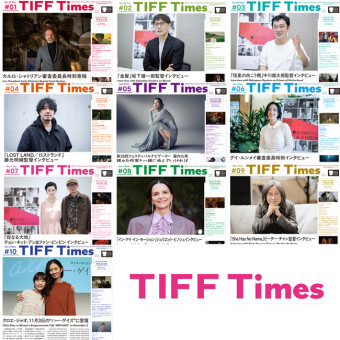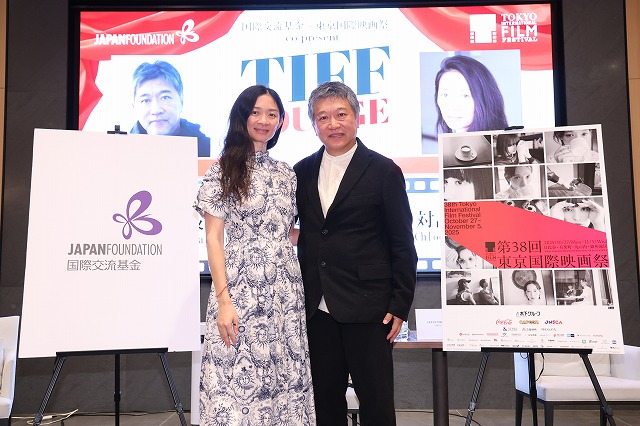
Demonstrating just why the TIFF Lounge series, co-presented by The Japan Foundation and the Tokyo International Film Festival, has become such a highlight of the festival, a large crowd of cinema enthusiasts gathered to witness a historic meet-up between heralded filmmakers Kore-eda Hirokazu and Chloé Zhao on November 2. With no need for a moderator, their conversation was so friendly and intimate, the audience soon felt like the proverbial fly on the wall.
Zhao’s latest feature, Hamnet—which is widely tipped for a slew of Oscar® nominations—is showing as the TIFF Closing Film, and the writer-director is also set to receive the festival’s Kurosawa Akira Award; while Kore-eda anticipates a January 2026 release for his next work, Sheep in the Box.
“I’m in the middle of shooting now,” he told Zhao, “But I’m taking time off from the set so that I could be here to meet you today. I’ve been looking forward to this for so long.”
TIFF Programming Director Ichiyama Shozo mentioned that the festival had invited her several times, and she had finally been able to come.
“I’m such a big fan of Kore-eda-san,” said Zhao, “so to hear him say what he just said is… thank you!”
The discussion began with Kore-eda commenting on Hamnet, which he’d seen in a private screening. “But since not everyone has seen it yet, we should try to avoid spoilers. It’s a film about every aspect of creation, and I felt like it told me what I’m doing is okay.”
Zhao mentioned that she had “made the mistake of rewatching After Life this morning, since I’m such a fan of Kore-eda-san’s, and when they came to do my makeup, I’d been crying for an hour. That film is about how we see our lives, whether joyful or painful, mirrored back to us. It gives our lives meaning. It makes the human experience a little less difficult. It also made me feel purposeful. I think the people who are making films in After Life are similar to Shakespeare in Hamnet.”
Said Kore-eda, “We don’t know how the film will end, and the director is trying to discover how the film will end. In [Zhao’s film] Nomadland, too; you’re on a journey with the protagonist and you don’t know where it’s going to end, just like life itself. Hamnet is similar, and I was very happy to see that journey.”
Said Zhao, “Hamnet is about the internal landscape, whereas Nomadland is about the external and the internal landscape. But what made the film work, the big catharsis of the film, wasn’t there even four days before the shoot was going to end. [At the time], I felt like the film wasn’t working, but I’d been there before. When I go into making a film, I never know how it’s going to end. I know, deep inside, that it’s not there yet, and often my actors know.”
“I have to come to set every day and half the time I know what will happen, half the time I don’t. I hear Kore-eda-san say that he always watches and waits for the ending to show up. You’re always this far from it not happening, but that’s how life is.”
Kore-eda told her, “I’m shooting my new film now, and we only have two weeks left. The last scene, we’ve already shot, but I keep wondering what else I can do with the actors. I always rewrite the script on set, and the things I write in those moments are always much richer. In Hamnet, did you discover things on set or in the editing? Do you edit every day?”
“I sleep,” laughed Zhao. “I need 8 hours, or I can’t work. You’re saying you edit every night?”
“Yes. I edit every night when I get home, and my crew receives notes from me really late. We try to finish working by dinnertime. In Japan, we often shoot until 2 am and start again the next day at 6 am, so we just can’t sleep. When children are on set, we can’t shoot for as long, of course.”
Said Zhao, “I don’t touch the edit until we finish, because I don’t want the studios to see anything. Not really! I’m afraid of editing on set. There’s a downside to it because sometimes it’s not really finished until the shoot ends. If I edit earlier, I’m so influenced by everyone around me, I’m afraid it might change the outcome.”
“With Hamnet, my actress Jessie Buckley (who plays Shakespeare’s wife, Agnes) knew that we didn’t have an ending. After filming it, I looked at it and felt like it didn’t work. Jessie was like, ‘After all that, this is it?’ I was going through a bad time in my personal life, and Jessie sent me Max Richter’s ‘This Bitter Earth/On the Nature of Daylight.’ When I listened to it, it has a very special ability to harmonize your whole body to the world around you. I listened to it and started crying, and I saw myself reaching my hand out the window to the rain. You can’t lose love, it transforms into something else. When you’re in deep loss, you have to have a oneness. That’s how we created the ending. So it was a collaboration with my actress. Sometimes when you don’t know, that’s the best place to be.”
Kore-eda asked how she felt about not working in her mother tongue. Zhao found the upside: “The joy of that is that I don’t have to feel responsible, I don’t have the burden on my shoulders of being American. I don’t know Shakespeare very well, so I just did what I wanted. Before mastering the language, I had this insecurity about being a storyteller even though I couldn’t speak perfectly, so I studied politics. My favorite cinema has a lot of silence in it; it’s about how your face and body move. Nonverbal cues that I relied on as a student helped me, and [the early lack of fluency] became an advantage later.”
Since he’d discussed writing and editing, Zhao asked Kore-eda about his typical workload. “What I’m doing now is everything, from the original idea to screenplay to shooting and editing. There’s always a storyboard, but when I get on set, Kondo Ryuto, who also shot Shoplifters and Monster, takes a different perspective. That’s thrilling for me. We try to understand one another’s point of view, and figure out where to put the camera. These daily discussions are a lot of fun. It’s much more creative than rushing to finish just to comply with the schedule.”
“What about your relationship with actors?” Zhao said.
“I have good relationships, but if they like the changes I make on set, it’s better. I’m now working with Daigo, the comedian, for the first time. I don’t have to decide all the action, he can move in a very interesting way. It’s not my usual way of doing things, but depending on what kind of actor the person is, I look for the best way to communicate with them.”
Professing to love Kore-eda’s series The Makanai: Cooking for the Maiko House, Zhao asked whether the naturalistic performances were an outgrowth of his experience shooting documentaries.
“It’s not really from documentary,” he responded. “It’s all about what’s happening in front of you, and how you can capture that. In your films The Rider and Nomadland, you were shooting non-professional actors, and I wondered, why make fiction instead of documentary?”
“I think documentary filmmakers are very brave,” replied Zhao. “I’m exploring making one now, but it’s safer for me to make fiction. When you’re making a documentary, you’re saying ‘this is me, and this is the subject.’ Werner Herzog, one of my favorite filmmakers, can film someone on death row (in Into the Abyss). I haven’t found that kind of courage.”
“In America, marginalized people, often they’re looked at as social-issues subjects in the news or documentaries, and they’re filmed in a rough way under unflattering lights. But if you’re with them, you see the most beautiful landscapes. It was very important for me and my DP to capture these faces that haven’t been given the same cinematic treatment, during golden hour, because you can feel some bigger power beyond you. The quality of the lighting makes us feel like we’re one.”
“It’s important for us to make our audience understand, through [poetic images], the truth—the emotional truth as well as the factual—about these people.”
Nodded Kore-eda, “There was a line like ‘your home is inside your heart’ in Nomadland. It was like they were American pioneers, and there was this beauty around these people living marginalized lives. In your Western (The Rider), too, you showed such beautiful horizons.”
“Whenever life gets really crazy, I feel like the best advice is to do your laundry, make coffee, chop wood, daily things,” said Zhao. “Your films look at the details of how people live their lives. Cinema often focuses on the highs and lows, not depicting the things we spend 80 percent of our time doing. But you invite us into the daily rituals and then go very deep. It always hits me like a tsunami. You make us feel things we don’t usually feel.”
“Your films are existential, because you’re clearly trying to understand the meaning of life. Can you tell us your philosophy?”
Kore-eda smiled guiltily. “My work-life balance is gone now. I didn’t make a film last year, but this year I have two. It’s not like I don’t like having two, it actually gives me a lot of joy, but I don’t want people to think that you have to do this to be a filmmaker. I’m like the grandfather having fun making movies, and that’s the impression I want to create. I want to inspire young filmmakers who see me having fun. Making films is the only thing I can do.”
“If you were my actor,” said Zhao, “I would say that I sense a beautiful bittersweetness in how you were talking just now. It reminds me of After Life, which I was watching at 4am because I was jetlagged. I would not choose a memory and [I would] stay there, in limbo. I cried because I thought maybe something is wrong with me. Maybe I’m still afraid of life. But some of my favorite memories are from making make-believe for other people’s memories.”
“Shakespeare is also a man who had a lot of trouble connecting in real life, but when he’s onstage, he can connect with everything. So for many of us who chose to be a storyteller, it’s bittersweet.”
A beat. “[You and I] can stay in limbo together.”
“I made After Life in 1998 and there are a lot of people in the US who love the film, although not so many Japanese have seen it. I’m very glad it spread in that way. I first wrote the screenplay when I was 28, and for people who are capturing lives with their cameras, it is bittersweet. Even now, I feel that way.”
Zhao said, “I believe stories choose us when the lightning collectors are ready. My first three films were about identity and people coming together to find answers. I think that’s what I’m looking for: how do we dissolve the illusion of separation that we feel? Whatever story comes next to me, I believe in the power of threes.”
To Kore-eda, one of the audience members asked, “You make intimate, cinematic films at a time when people are increasingly watching on smaller screens. How do you feel about that?”
“I never watch films on my phone,” he said. “I saw Hamnet in a preview room, and although there were only two of us there, we had the experience of being together in a dark room, watching the film, and I think that experience completes the film. That’s why I’m making film.”
Zhao said, “Life is a great paradox. It’s important to have a communal experience. But I’ve traveled all around the US and because of our phones and technology, a Kore-eda film can be watched by a teenager in South Dakota. It’s a paradox.”
Turning to casting, Zhao noted that “Casting is 80 percent of the work for me. In The Rider, Brady, the cowboy, was on a ranch where I was playing video games. I went outside to get some air and I saw this teenager on a horse and he was amazing. He started telling me about saddles, and I saw a bone sticking out on the back of a horse. ‘What’s that?’ I asked him. He said, ‘Ma’am, that’s what god put on the horse to hold the saddle.’ Who talks like that?! I just knew, if I was mesmerized by him, so would you be.”
Kore-eda admitted that he is always thinking about the next project(s), even in the middle of the current project(s). “I’ve already completed a screenplay, and after I edit the two films I’m shooting now, I’m going to shoot it. When I write, I try to write in story order, in two days. I make revisions, but I don’t sleep for two days to finish the first draft. I have the basic idea for the script. If I stop in the middle, the script would be different.”
Eyes wide, Zhao assured him, “You’d do so well in Hollywood! They would love you.”
TIFF Lounge Co-presented by The Japan Foundation & Tokyo International Film Festival
Conversation between Kore-eda Hirokazu and Chloé Zhao
Guests: Kore-eda Hirokazu (Filmmaker), Chloé Zhao (Filmmaker)
Moderator: Ichiyama Shozo (TIFF Programming Director)











